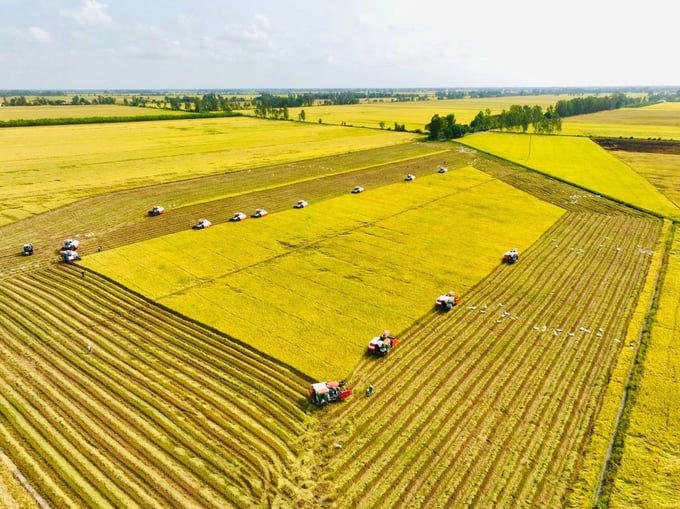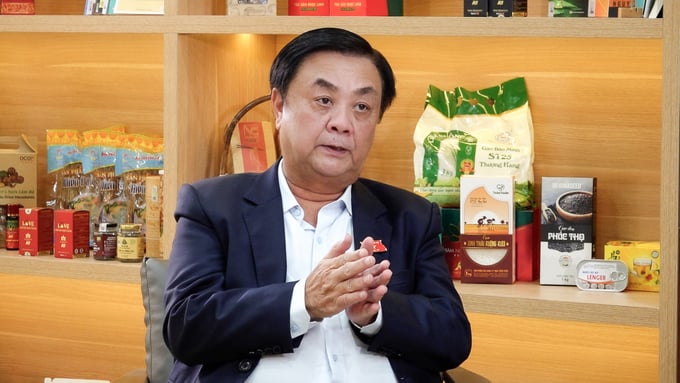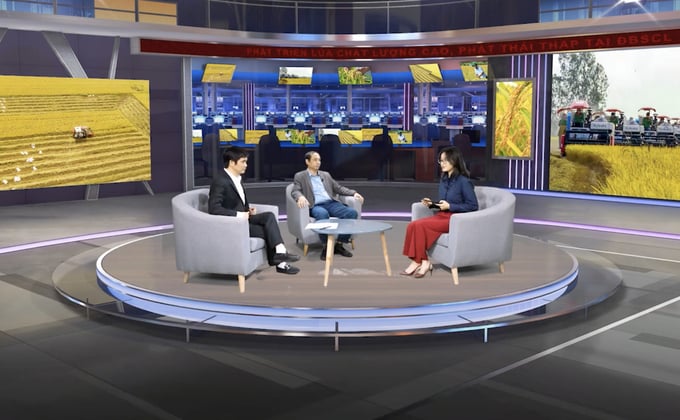November 26, 2025 | 01:37 GMT +7
November 26, 2025 | 01:37 GMT +7
Hotline: 0913.378.918
November 26, 2025 | 01:37 GMT +7
Hotline: 0913.378.918

The One Million Hectares Project marks a significant transformation in the landscape of rice production. Photo: Le Hoang Vu.
In recent years, the rice industry has steadily asserted its position as a pivotal sector in our country’s agriculture. The recent Government’s approval of the “Sustainable Development Project of one million hectares specializing in high-quality, low-emission rice cultivation associated with green growth in the Mekong Delta until 2030” is instigating momentum for the entire nation to embark on a sustainable trajectory.
A central focus of the Project is scientific and technological innovation, marking a significant stride toward green agricultural transformation in Vietnam.
Minister of Rural and Agricultural Development Le Minh Hoan said: “To produce well, we must start from seed research, water research, farming processes, and application of scientific advances in knowledge agriculture. For example, sensors are used in the field, drone spraying, mechanized techniques, etc.
Thus, there is still a lot of room to bring science and technology into the rice industry so that we can create higher value. Especially when moving from traditional rice production to high-quality rice, reducing emissions associated with green growth, associated with a circular economy.”

Minister Le Minh Hoan discusses the opportunity for the Vietnamese rice sector. Photo: Thanh Thuy.
Facing global challenges of climate change and environmental pollution, Vietnam's low-carbon rice model initiative is welcomed by international partners.
Regarding sustainable agriculture, Dr. Vo Tong Xuan, an esteemed rice scientist, shared: “One way to avoid climate change is to correct and improve how rice farmers apply fertilizer. On that basis, we produce high-yield rice at a lower cost thanks to using less fertilizer and reducing chemical fertilizer content, thereby reducing greenhouse gases from rice fields.”
The overall goal of the One Million Hectares Project is to reorganize the production system along the value chain, apply sustainable farming processes, improve the income and lives of rice growers, as well as protect the environment.
To achieve the target of cutting methane emissions by 30% by 2030, this transition will require significant investment and major policy reforms to promote and change the perceptions of stakeholders from farm households to the entire economy.
To realize the outlined objectives, the agricultural science industry will play a pivotal role in contributing knowledge, transferring techniques, predicting risks, and offering policy advice for the sustainable development of the rice industry. Simultaneously, there is a pressing need for specific policies to elevate the brand of Vietnamese rice and enhance the competitiveness of our country’s rice products in the international market.
Vietnam Agriculture Newspaper interviewed Dr. Tran Cong Thang (Director of the Institute of Policy and Strategy for Agricultural and Rural Development) and Dr. Dao The Anh (Deputy Director of the Vietnam Academy of Agricultural Sciences) to delve more deeply into the Project’s goals.
“The primary focus lies in restructuring production to establish specialized rice cultivation areas, standardizing varieties and production processes, implementing planting area codes, and standardizing emission reduction processes. Furthermore, concerning low emissions, the project encompasses measures to reduce emissions, minimize input resources, especially chemicals, and promote water conservation,” Director Thang informed.

Dr. Tran Cong Thang and Dr. Dao The Anh provide insights into challenges and solutions in rice production.
With a direction towards a circular economy, post-harvest considerations involve processing straw for subsequent use; rice straw will be recycled. The project envisions that in the future, 100% of straw will be collected from fields and repurposed to create added value.
Another key objective is by 2030, to establish 20% of export rice brands associated with low emissions, thereby bolstering the standing and value of Vietnamese rice on both national and global scales. From a social perspective, the project aims to train approximately one million farming households in sustainable farming practices by 2030, aligning with Vietnam's millennium goals.
Dr. Dao The Anh added to the conversation, providing information about low-emission rice production models in the world.
He said: “It can be affirmed that wet rice production is predominantly concentrated in Asia and Africa on a global scale. At the 6th International Rice Congress (IRC 2023) held in the Philippines, emissions reduction in wet rice production emerged as a pivotal topic, garnering extensive interest and discussion among international experts and researchers.
However, implementation proves challenging due to the prevalence of small-scale and dispersed farming households, posing a unique challenge for wet rice production. Addressing this challenge requires solutions that reduce emissions, enhance food production and minimize natural resource consumption. This is precisely the direction Vietnam is moving towards.”
The One Million Hectares High-Quality Rice Project, focusing on low emissions, is an initiative where Vietnam positions itself as a potential leader. It is a prudent decision, albeit bold and with certain challenges. Leading in this endeavor, Vietnam will garner support from the global community, both in terms of technical expertise and financial backing.
Translated by Quynh Chi
/2025/11/24/3536-2-112800_176.jpg)
(VAN) Dong Nai now has tens of thousands of hectares of forests certified for sustainable management, and this area will continue to be expanded in the coming period.

(VAN) Vinh Ha hamlet (Dai Xuyen commune, Hanoi) is shifting away from small-scale farming as households adopt bioscurity into their breeder chicken models.

(VAN) Heavy rains make aquatic species more vulnerable to disease. Proactive water management and high-tech systems help farmers prevent outbreaks and protect yields.

(VAN) Greenhouses are shifting production mindsets in Binh Lu commune, enabling farmers to ‘weather the sun and rain’ and secure stable vegetable harvests throughout the year.

(VAN) Green transition is crucial for the Mekong Delta amid climate change and stricter standards, offering a path toward sustainability.

(VAN) Dong Thap promotes agricultural restructuring, forms large specialized farming zones, raises the value of agricultural products and develops toward ecological and high-tech directions.
/2025/11/22/4018-4-213342_747.jpg)
(VAN) The Mekong Delta Agricultural Experts Club has attracted 143 experts and researchers to participate in providing consultancy and contributing initiatives to the development of one million hectares of high-quality rice.